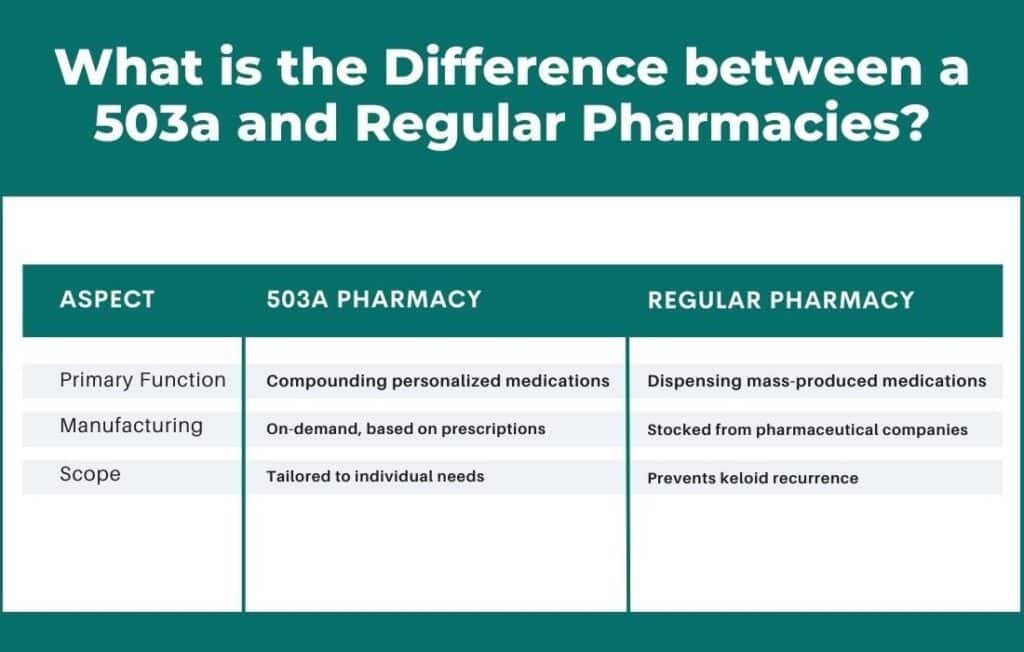In the bustling tech hub of Santa Clara, California, healthcare innovations go beyond mere cutting-edge medical devices and therapies. A prominent example of such innovation is the emergence of 503a Pharmacy in Santa Clara —distinctly different from regular pharmacies in Santa Clara. This article will explore the unique characteristics that define a 503a Pharmacy in this vibrant city.
What is the Difference between a 503a and Regular Pharmacies?

503a pharmacies, often called compounding pharmacies, are specially designated to prepare personalized medications for patients.
On the other hand, regular pharmacies primarily dispense mass-produced medications from pharmaceutical manufacturers. The distinction between the two is primarily based on their operational and manufacturing practices.
| Aspect | 503a Pharmacy | Regular Pharmacy |
| Primary Function | Compounding personalized medications | Dispensing mass-produced medications |
| Manufacturing | On-demand, based on prescriptions | Stocked from pharmaceutical companies |
| Scope | Tailored to individual needs | Generalized to cater to the majority |
Regulatory Oversight: How the FDA and State Boards Govern Each.
The Food and Drug Administration (FDA) establishes guidelines and regulations for 503a and regular pharmacies. However, 503a pharmacies typically face stricter oversight as they engage in compounding practices. Additionally, State Boards of Pharmacy ensure that both types of pharmacies comply with state-specific regulations. While regular pharmacies are still regulated, their primary focus lies in dispensing rather than manufacturing.
| Aspect | 503A Compounding Pharmacy | Regular Pharmacy in Santa Clara |
| Definition | Pharmacies that compound medications on a patient-specific basis or in anticipation of prescriptions based on established histories. | Pharmacies that dispense manufactured drugs based on prescriptions to patients. |
| FDA Oversight | Primarily overseen by state boards, but must also comply with certain FDA guidelines (e.g., USP chapters related to compounding). | Overseen by the FDA concerning manufactured drug approval, labeling, and safety, and the state board for practice operations. |
| State Board Oversight | Overseen by the California Board of Pharmacy. They ensure adherence to state regulations and standards. | Similarly, it is overseen by the California Board of Pharmacy in Santa Clara for pharmacy practice standards and regulations. |
| Compounding Restrictions | Can only compound based on a specific patient prescription or in limited quantities in anticipation of prescriptions. Cannot replicate commercially available products unless they meet certain criteria. | Typically, do not compound. They dispense commercially manufactured drugs. |
| Inspection Frequency | Depending on the volume and type of compounding, it may be inspected more frequently than regular pharmacies to ensure compliance with compounding standards. | Regular inspections by the California Board of Pharmacy and occasional inspections by the FDA (mainly for the drug supply chain). |
| Adverse Event Reporting | Must report adverse events to the FDA and the California Board of Pharmacy. | Must report adverse events associated with medications to the FDA. State-based reporting may also be required. |
| Drug Quality and Security Act | Must comply with Section 503A of the Federal Food, Drug, and Cosmetic Act, which details conditions to qualify for exemptions from certain FDA requirements. | Regular pharmacies are primarily affected by the Drug Supply Chain Security Act provisions, ensuring a traceable supply chain. |
Compounding Practices: Personalized Medications vs. Mass-Produced Drugs

503a pharmacies have a specialized focus on compounding. This involves the creation of medications that are tailored to meet the specific needs of individual patients. In contrast, regular pharmacies primarily dispense pre-made medications manufactured by pharmaceutical companies. The difference in practices means that 503a pharmacies can offer personalized solutions that off-the-shelf drugs may not be able to provide.
- Compounding can cater to allergies, dosage forms, or specific strengths.
- Regular pharmacies provide medications with standardized dosages and forms.
- 503a pharmacies require specialized equipment and training for compounding.
- Compounded medications are not always available in regular pharmacies.
- Regular pharmacies might have a broader range of commercial drugs.
- Compounding can be essential for pediatric or geriatric patients with unique needs.
| Feature | 503a Pharmacy | Regular Pharmacy |
| Medication Type | Custom-compounded | Commercially available |
| Dosage Forms | Customizable (e.g., gels, tablets) | Standardized forms (e.g., tablets, capsules) |
| Production Scale | Small-scale, individualized | Large-scale, mass-produced |
Volume of Production: Batch Production vs. Individualized Compounding.
503a pharmacies, cater to individual patients, typically produce medications in smaller quantities. On the other hand, regular pharmacies handle larger volumes of mass-produced medications. The production scale in each type of pharmacy directly influences its inventory management. This in turn affects storage practices and distribution methods.
| Aspect | 503a Pharmacy | Regular Pharmacy |
| Production Volume | Low (individual or small batches) | High (bulk orders) |
| Inventory Management | Based on immediate patient needs | Based on demand forecasting and turnover rates |
Quality Control and Assurance: Regular pharmacy and 503a Pharmacy in Santa Clara
In both 503a and regular pharmacies, ensuring medication quality is of utmost importance. However, given the specific nature of compounding, 503a pharmacies typically implement more rigorous quality control checks for each batch. On the other hand, regular pharmacies rely on pharmaceutical manufacturers to uphold the necessary quality standards.
- 503a pharmacies conduct frequent tests on compounded medications for potency and purity.
- Regular pharmacies ensure the quality of storage and dispensing.
- Pharmaceutical manufacturers are responsible for the quality of mass-produced drugs.
- 503a pharmacies might have in-house labs for quality testing.
- Regular pharmacies focus on expiration dates and proper storage conditions.
- Both types prioritize patient safety through quality assurance.
Safety and Sterility Protocols: Ensuring Patient Safety in Both Pharmacies.
Sterility and safety play a crucial role in pharmacies. In particular, 503a pharmacies follow strict sterility protocols, especially when compounding injectables or ophthalmic solutions. Meanwhile, regular pharmacies prioritize the secure storage and dispensing of medications while focusing on preventing contamination and ensuring proper usage.
| Safety Feature | 503a Pharmacy | Regular Pharmacy |
| Sterility Area | Clean rooms or specialized areas | General storage areas |
| Dispensing | Custom containers, often with specific instructions | Standardized, tamper-evident containers |
Pricing and Insurance: How Costs and Coverage Differ.
Pricing in 503a pharmacies can vary due to the specialized nature of compounding and their personalized approach. As a result, certain compounded medications may incur higher costs. In contrast, regular pharmacies that deal with mass-produced drugs usually have standardized pricing, and their products are more commonly covered by insurance.
- Insurance plans might not always cover compounded medications.
- Regular pharmacies benefit from bulk purchasing, which can lead to competitive pricing.
- 503a pharmacies have costs associated with specialized equipment and ingredients.
- Insurance coverage in regular pharmacies is often more predictable for consumers.
- 503a pharmacies might offer financial assistance or payment plans for specific treatments.
- Both types of pharmacies aim to provide value while ensuring patient health.
| Medication | 503A Pharmacy | Regular Pharmacy |
| Hydrocortisone cream 1%, 1 oz | $25 | $15 |
| Albuterol inhaler, 200 puffs | $40 | $30 |
| Minoxidil 5% topical solution, 60 mL | $50 | $40 |
| Prozac 20 mg, 30 tablets | $60 | $50 |
| Lisinopril 20 mg, 90 tablets | $70 | $60 |
Patient Interaction and Counseling: The Role of Pharmacists in Each Setting.

In certain pharmacies, specifically those labeled as 503a, pharmacists frequently engage in more personalized interactions with patients. These conversations aim to understand their requirements better and tailor their medications accordingly. On the other hand, regular pharmacies also provide patient counseling; however, their focus tends to revolve more around dosage instructions and potential side effects related to mass-produced drugs.
- 503a Pharmacists require a deep understanding of compounding to advise patients effectively.
- Regular pharmacists are trained to provide information on various commercial drugs.
- 503a pharmacies might have more extended consultations to understand patient needs.
- Regular pharmacies often have tools and resources for drug interaction checks.
- Both types prioritize patient education to ensure medication adherence and safety.
- Pharmacist-patient relationships are crucial for effective treatment in both settings.
Local Impact: The Role of 503a and Regular Pharmacies in Santa Clara’s Healthcare Landscape.
503a and regular pharmacies play vital roles in Santa Clara’s healthcare ecosystem. While 503a pharmacies specialize in compounding to address specific medical needs, regular pharmacies serve the broader community by providing essential medications. Together, they contribute to the holistic health and well-being of Santa Clara residents.
- 503a pharmacies in Santa Clara cater to niche medical needs, enhancing healthcare quality.
- Regular pharmacies serve as primary medication providers for the majority of residents.
- Both types collaborate with local healthcare providers for comprehensive patient care.
- Santa Clara’s diverse population benefits from the specialized services of 503a pharmacies.
- Regular pharmacies in Santa Clara might host community health events or vaccination drives.
- Together, they are integral to Santa Clara’s healthcare infrastructure.
The healthcare scene in Santa Clara boasts diversity and an ever-evolving nature. A 503a Pharmacy is crucial in this landscape by providing tailored solutions that regular pharmacies may not offer. As residents prioritize personalized care, these specialized pharmacies are becoming increasingly prominent, further solidifying Santa Clara’s reputation as a hub for healthcare innovation.
Ready to understand the distinction between 503a Pharmacies and regular pharmacies in Santa Clara’s healthcare landscape? Dive into the world of personalized medication solutions and mass-produced drugs by booking a consultation with Aceso Courier. Discover how 503a Pharmacies specializes in custom compounding to meet individual needs while regular pharmacies offer standardized options. Make an informed choice for your healthcare needs – Contact the Team to Book a consultation today!
FAQs
What exactly is a 503a Pharmacy?
A 503a Pharmacy, or a compounding pharmacy, focuses on preparing personalized medications for patients. These specialized pharmacies carefully mix or alter ingredients to meet specific needs and ensure optimal treatment outcomes.
Can I get regular medications from a 503a Pharmacy?
503a Pharmacies primarily focus on compounding medications, but many also carry and dispense commercially available drugs.
Are compounded medications safe?
Compounded medications are considered safe when prepared by licensed professionals in 503a Pharmacies. These professionals adhere to guidelines and standards set by regulatory bodies, ensuring the utmost safety and quality.
Why might a medication be more expensive at a 503a Pharmacy than a Regular Pharmacy?
The costs of certain medications in a 503a Pharmacy can be higher due to the personalized nature of compounding, specialized ingredients, and equipment used.
Will my insurance cover medications from a 503a Pharmacy?
Insurance coverage varies depending on the insurance plan. While some plans may include compounded medications, others might not provide such coverage. It is crucial to consult your insurance provider for accurate information.









